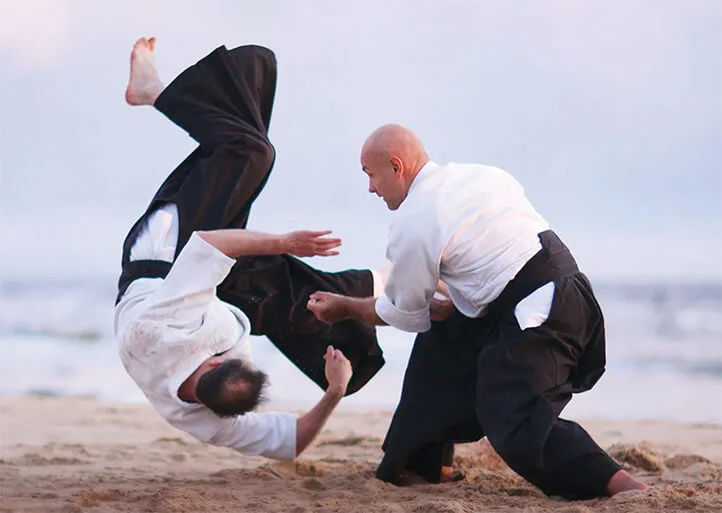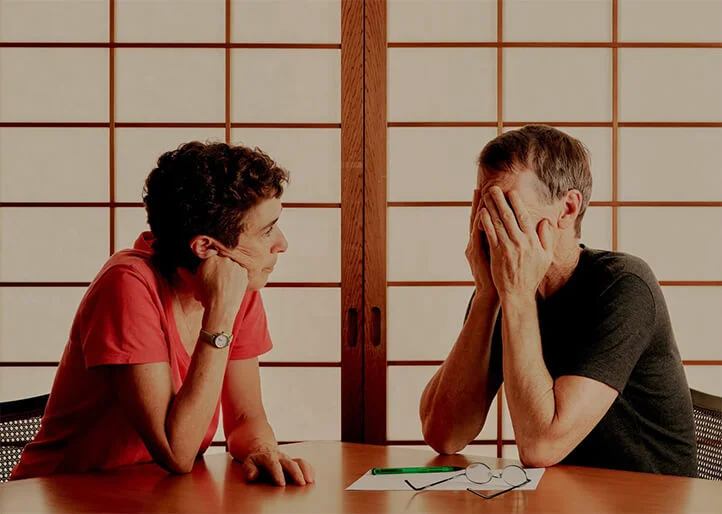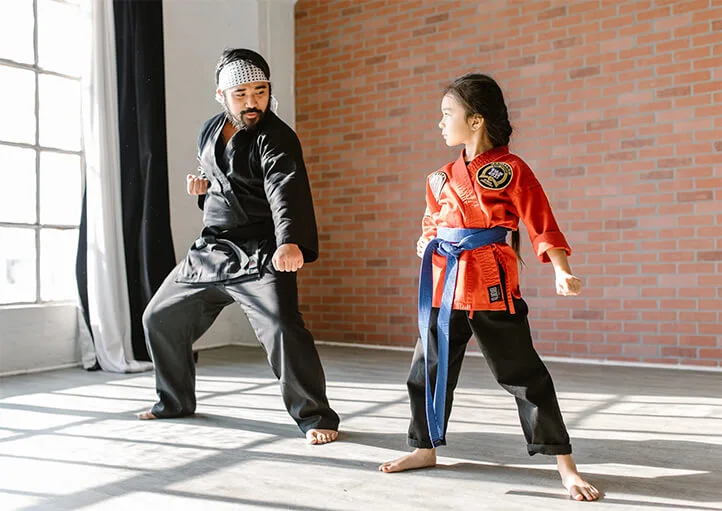Psychological Aikido is an approach in psychology based on the principles of Aikido, a Japanese martial art that emphasizes using an opponent’s energy to one’s advantage rather than engaging in direct confrontation.
In the context of psychology, psychological Aikido transfers its philosophy to interpersonal relationships and teaches the skillful transformation of aggression, negativity, or stress into positive energy. This is achieved through skills such as active listening, nonverbal communication, empathy, and techniques of self-awareness. The goal of psychological Aikido is to achieve harmony with oneself and the surrounding world.
The concept of psychological Aikido originates from the ancient Japanese martial art of Aikido, created by Morihei Ueshiba in the 1920s, which combines physical techniques with a spiritual philosophy emphasizing harmony and peace.
In the 1960s, this approach was first applied in the United States in psychotherapy and psychological counseling. Psychologists began using the term “psychological Aikido” to describe a therapeutic approach that included active listening, empathy, and nonverbal communication to help clients better understand and manage their emotions and behavior.
Since then, psychological Aikido has become a widely recognized approach used to help people resolve conflicts, improve communication, and relieve stress.

Key Principles of Psychological Aikido
Psychological Aikido is based on several key principles derived from the philosophy of the martial art of Aikido. Firstly, instead of direct confrontation, it aims to redirect or transform negative energy into a more positive direction.
This is achieved through the ability to listen, empathy, and self-awareness. The main idea is not to resist but rather to “go with the flow,” adapting and using the energy of the situation to one’s advantage.
The second important principle of psychological Aikido is the pursuit of harmony both within oneself and in relationships with others. The principle of harmony implies seeking balance and mutual understanding rather than conflict and division.
The Principle of Non-Resistance
The principle of non-resistance is key in psychological Aikido. It does not mean passivity or surrender; rather, it means avoiding direct confrontation or fighting force with force. Instead of opposing aggression or conflict, psychological Aikido teaches the redirection of negative energy.
This is achieved by accepting and understanding the other person’s point of view rather than directly refuting or denying it. The principle of non-resistance allows for finding constructive solutions, minimizing emotional clashes, and reducing stress. This principle requires flexibility of thought and the ability to view the situation from different perspectives.
The Principle of Harmony and Balance
The principle of harmony and balance in psychological Aikido means striving for inner and outer equilibrium. On an inner level, this involves balancing our emotions, thoughts, and behaviors, striving for self-understanding and self-acceptance, and the ability to manage our feelings so that they do not work against us.
On an external level, the principle of harmony and balance means striving for peaceful and balanced interactions with others. This includes the ability to listen and understand others, willingness for constructive and respectful communication, as well as the ability to find common ground and resolve conflicts peacefully.
The Principle of Using the Opponent’s Energy
The principle of using the opponent’s energy in psychological Aikido means the ability to transform and redirect negative or aggressive energy instead of confronting it. This involves the ability to perceive and understand the emotions and motives of the other person and use this understanding to manage the situation.
For example, instead of responding to aggression with aggression, psychological Aikido might employ the tactics of active listening, affirmation, and empathy to redirect the negativity. This helps to defuse emotions and maintain a dialogue, allowing for more constructive and harmonious solutions. This principle requires practice and skills in self-awareness, empathy, and effective communication.

The Connection Between Psychological Aikido and Traditional Aikido
Psychological Aikido is based on the philosophy and principles of traditional Aikido, a Japanese martial art. Principles such as harmony, non-resistance, and using the opponent’s energy have been transferred from the physical context to the psychological sphere. In traditional Aikido, these principles are applied to manage physical force and redirect an opponent’s attack safely, while in psychological Aikido, they are used to manage emotional dynamics and redirect psychological pressure.
Similarly to traditional Aikido, psychological Aikido adheres to spiritual and ethical principles such as respect for others, the pursuit of harmony, balance, and striving for non-violent conflict resolution. In both contexts, the concept of “Aikido” translates to “the way of harmonizing the spirit,” and this core aspiration is reflected in the practices of both physical and psychological Aikido.
Similarities and Differences
The similarities between psychological Aikido and traditional Aikido include the following aspects:
- Core Principles: Both approaches emphasize non-resistance, using the opponent’s energy, and striving for harmony and balance.
- Ethical Values: Both traditional and psychological Aikido emphasize the importance of respect, fairness, and non-violent conflict resolution.
- Focus on Learning: Both approaches recognize the importance of continuous learning and development, regardless of experience or skill level.
However, there are notable differences:
- Context of Application: Traditional Aikido is a martial art focused on physical defense and self-protection. Psychological Aikido is applied in a psychological context, focusing on managing emotions, thoughts, and behavior.
- Methods and Techniques: While traditional Aikido uses physical techniques and movements, psychological Aikido employs psychological tools and strategies.
- Learning and Practice: Training and practice in traditional Aikido typically take place in a dojo under the guidance of a master, while psychological Aikido can be learned through reading, workshops, or consultations with a psychologist.
Transferring Physical Principles to the Psychological Level
The transfer of the physical principles of Aikido to the psychological level occurs through analogies and metaphors applicable to interpersonal interactions and internal processes.
- Non-Resistance: In physical Aikido, the practitioner avoids direct confrontation with the opponent, instead redirecting the energy of the attack to a safe path. On a psychological level, this means avoiding direct conflict and aggressive responses. Instead of fighting back against an emotional attack, the person learns to accept, listen, and understand, redirecting the energy toward building bridges and solving problems.
- Using the Opponent’s Energy: In Aikido, the practitioner uses the energy and movements of the attacker against them. In a psychological context, this means using the opponent’s arguments or emotions as a basis for dialogue or problem-solving.
- Harmony and Balance: In Aikido, the practitioner strives to maintain balance and harmony, even under the pressure of an attack. On a psychological level, this means maintaining mental and emotional equilibrium, the ability to stay calm and focused, even in difficult situations or under pressure.
Overall, the principles of Aikido help to master techniques for redirecting aggression and learning to respond to conflicts flexibly and constructively while maintaining one’s psychological health and well-being.

Psychological Aikido in Conflict Situations
Psychological Aikido demonstrates significant effectiveness in conflict situations. Instead of direct confrontation and aggression, the key principles here are the acceptance and redirection of conflict energy. This approach allows for interaction with the opposing side without compromising one’s own emotional equilibrium and while maintaining respect for the other participant in the conflict.
In particular, Psychological Aikido may involve active listening, empathy, and strategies of nonviolent communication. Rather than defending or counterattacking, the individual learns to perceive the emotions and position of the other without engaging in direct confrontation. This leads to a deeper understanding, reduces tension, and fosters the search for mutually acceptable solutions.
Application Methods
- Non-Resistance: Instead of directly opposing or rejecting the opponent’s position, try to understand and acknowledge their point of view. This helps create an atmosphere of mutual respect and openness.
- Energy Redirection: Use the emotions and arguments of the opponent to find a common solution. If someone is aggressive or angry at you, try to redirect this energy towards finding constructive solutions rather than engaging in a fight or self-defense.
- Balance: Maintain your emotional balance in any situation. Do not allow another person’s aggression or stress to affect your own state. Instead, focus on your inner calm.
- Active Listening: Try not only to listen to the words but also to perceive the emotions and intentions of the opponent. This will help you better understand their position and find common ground.
- Nonviolent Communication: Instead of accusations, express your feelings and needs clearly and directly, without aggression or offensiveness. This helps to reduce tension and improve communication.
All these application methods of Aikido principles can be particularly useful in conflict situations, helping to turn confrontation and conflict into an opportunity for growth, mutual understanding, and cooperation.
Examples and Analysis of Specific Cases
Let’s consider two examples of using Psychological Aikido principles in conflict situations:
- Workplace Situation: Imagine a colleague criticizes you during a meeting, perhaps due to stress or misunderstanding. Instead of reacting aggressively or defending your position, you apply Aikido principles. You acknowledge their feelings (non-resistance), try to understand their point of view (active listening), maintain your emotional balance, and suggest discussing the issue more constructively after the meeting (energy redirection). As a result of this approach, instead of escalating the conflict and damaging your reputation, you create an opportunity to resolve the issue and improve relationships with the colleague.
- Family Conflict: Your teenager rebels and speaks rudely. Instead of reacting angrily or punishing them, you apply Aikido principles. You acknowledge their feelings and independence (non-resistance), try to understand what they are going through (active listening), remain calm, and suggest discussing their problems in a more relaxed setting (energy redirection). As a result, you establish deeper and more open communication with your teenager, improving your relationship and helping them cope with their issues.
Both of these examples illustrate how the principles of Psychological Aikido can be applied in real-life conflict situations to achieve more harmonious and constructive outcomes.

Psychological Aikido in Everyday Life
Psychological Aikido offers an approach that helps us better understand how thoughts and feelings influence our reactions and learn to manage our own behavior. This contributes to calmness, stability, and emotional well-being in everyday life.
The principles of Psychological Aikido also help to strengthen our connections and improve relationships with others. They teach us to engage in more open and empathetic dialogue, to use conflict as an opportunity for closeness and growth, and to transform negative energy into positive interactions.
Application in Personal Relationships
The application of Psychological Aikido in personal relationships can be observed in several key aspects:
- Improving Communication: Psychological Aikido teaches us to be active listeners, which is crucial in personal relationships. It helps to process the information received from others with respect and empathy, improving mutual understanding.
- Conflict Resolution: Using Aikido principles helps to more effectively handle conflict situations in personal relationships. Instead of confrontation and struggle, we learn to redirect the energy of conflict, focusing on understanding and addressing the underlying issues.
- Creating Harmony: The principle of harmony, based on Aikido, allows us to create healthier and more balanced relationships by becoming aware of our actions and emotions.
Application in the Professional Sphere
Applying Psychological Aikido in the professional sphere offers the following notable advantages:
- Conflict Management at Work: Psychological Aikido provides effective strategies for managing conflicts in the workplace. This is particularly useful in team projects where disagreements often arise. The absence of a desire to engage in conflict and the ability to turn “attacking” energy into productive solutions reduces tension and promotes collaboration.
- Enhancing Negotiation Skills: Aikido principles can be applied in negotiations, where the personal qualities of the negotiator, such as calmness, confidence, and flexibility, are important. Using the opponent’s energy to achieve mutual understanding and mutually acceptable solutions enhances the negotiation process.
- Creating a Positive Work Environment: Practicing Psychological Aikido helps create a more positive and harmonious work environment. The ability to harmonize relationships, manage conflicts, and ensure open and empathetic communication contributes to team spirit and overall productivity.
In general, Psychological Aikido is a valuable resource for any professional seeking to improve their communication and interpersonal skills in the workplace.

A Critical View of Psychological Aikido
Although Psychological Aikido offers valuable principles for managing conflicts and improving interpersonal relationships, it is not without its controversial aspects. One of the main arguments of critics is that its principles are difficult to understand and apply without a detailed knowledge of traditional Aikido and its philosophy. For an unprepared person, the transfer of concepts from physical combat to the psychological sphere can be challenging and confusing.
Another concern is the potential for Psychological Aikido to be used for manipulative purposes. Some people may use its methods as a tool for manipulating others or avoiding direct conflict, rather than seeking to resolve the issue. This underscores the importance of ethical application of Aikido principles and the need for training in this psychological practice under the guidance of an experienced specialist.
Potential Limitations and Challenges
- Requirement for Knowledge and Practice: Psychological Aikido requires an understanding and application of complex concepts, which can seem challenging for beginners. Without proper guidance and practice, its principles may be misunderstood or misapplied.
- Risk of Manipulation: There is a danger that the principles of Psychological Aikido could be used unethically to manipulate others. This is important to keep in mind when learning and applying these methods.
- Avoidance of Conflict: Psychological Aikido can become a way to avoid directly confronting problems and conflicts instead of resolving them. This can lead to unresolved issues accumulating over time.
- Not Always Applicable: In some situations, the principles of Psychological Aikido may be ineffective or inapplicable, such as in situations requiring quick and decisive action.
- Lack of Scientific Research: Much of the literature on Psychological Aikido is based on anecdotal evidence and personal experiences of psychologists rather than scientific research. This means its effectiveness may vary significantly depending on individual circumstances.
Discussion of Criticism and Counterarguments
- Response to the Requirement for Knowledge and Practice: Although Psychological Aikido requires understanding and practice, these skills develop gradually through learning. Moreover, many people find deep satisfaction in this path of self-improvement and personal development.
- Response to the Risk of Manipulation: While the principles of Psychological Aikido can be used for manipulation, it is important to remember that their original purpose is to maintain harmony and respect for others. Unethical use of these principles constitutes abuse, not their true intent.
- Response to Conflict Avoidance: Psychological Aikido does not advocate avoiding conflicts but offers ways to resolve them through nonviolent resistance and mutual understanding.
- Response to the Lack of Scientific Research: Although there may be a lack of scientific research on Psychological Aikido, this does not negate its potential benefits. Many people report improved communication and conflict management skills after applying Aikido principles.
- Response to “Not Always Applicable”: All approaches and methods have their limitations, and Psychological Aikido is no exception. It offers an additional toolkit for managing conflicts and improving relationships but is not a cure-all for all problems.

Learning Psychological Aikido
Learning psychological Aikido begins with understanding its core principles and a deep exploration of its concepts. This involves familiarizing yourself with the principles of non-resistance, harmony, using the opponent’s energy, and transforming conflicts. The learning process often requires both theoretical study and practical application through role-playing, discussions, and reflective exercises.
Special attention is given to developing empathy, self-regulation, and mutual understanding. Since psychological Aikido emphasizes harmony and non-resistance, the training often includes meditative and mindfulness practices. Training sessions and courses in psychological Aikido may be conducted as individual sessions, group seminars, or even online courses.
Tips for Self-Study
- Study the Theory: Get acquainted with the basic principles and concepts of psychological Aikido. Read books, articles, and online resources on the subject. Key areas to explore include non-resistance, harmony, using the opponent’s energy, and conflict transformation.
- Practice Reflection: Develop the skill of self-reflection by thinking about your relationships and behavior in conflict situations. This will help you see how the principles of psychological Aikido can be applied in daily life.
- Role-Playing: Try applying the principles of psychological Aikido in controlled settings, such as through role-playing. This will help you better understand how to use these principles in real situations.
- Meditation and Mindfulness: Practice meditation and mindfulness to improve your perception and emotional regulation. This will help you better control your reactions.
- Consult a Professional: Find a qualified instructor or coach who can teach you how to apply the principles of psychological Aikido in real life.
- Continuous Practice: Remember that, like any psychological skill, applying the principles of psychological Aikido requires practice and ongoing development.
- Self-Awareness: Work on your self-awareness. Understanding your emotions, motives, and actions is a crucial part of applying the principles of psychological Aikido.
- Learn from Examples: Study examples of successful applications of psychological Aikido. This will help you understand how this approach works in practice.
Resources and Courses for Learning
- Books: Familiarizing yourself with scientific and popular works on the topic of psychological Aikido is a great starting point. Check out books like “Aikido in Everyday Life: Giving in to Get Your Way” by Terry Dobson and Victor Miller, as well as “Aikido and the Dynamic Sphere: An Illustrated Introduction” by A. Westbrook and O. Ratti.
- Online Courses: Online learning platforms like Coursera, Udemy, or Skillshare may offer courses or lecture series on psychological Aikido or related topics (conflict resolution skills, self-reflection, or self-awareness).
- Webinars and Workshops: Professionals in psychotherapy and coaching often conduct webinars or workshops on various psychological approaches, including psychological Aikido.
- Local Seminars and Workshops: In some cities, local seminars on psychological Aikido are held. This is a great way to gain practical experience and feedback from experienced specialists.
- Mentoring and Individual Practice Sessions: Individual sessions with an experienced practitioner or mentor are very useful for a deep understanding of psychological Aikido and for receiving personalized feedback.
- Audiobooks and Podcasts: There are audiobooks and podcasts that you can listen to on the go, as well as YouTube channels with video materials on psychological Aikido and related topics.

Conclusions
Psychological Aikido is an important and useful set of skills that can be applied in both everyday life and the professional sphere. It not only helps in better managing conflicts and stressful situations but also fosters flexible thinking, empathy, and the ability to establish effective interpersonal connections.
Based on the principles of traditional Aikido, psychological Aikido translates these ideas into the context of interpersonal relationships. The principles of non-resistance, harmony, and using the opponent’s energy form the foundation for wise and effective strategies for interacting with others.
However, like any approach, psychological Aikido is not a universal solution to all problems. Its effectiveness depends on the ability to apply its principles in specific situations and on the individual characteristics of each person. Therefore, it is important to approach the study and practice of this method with care and awareness.
Despite its limitations, psychological Aikido remains a valuable tool for personal development and improving the quality of life. It can be beneficial for many people seeking self-improvement and harmonious relationships with the world around them.




